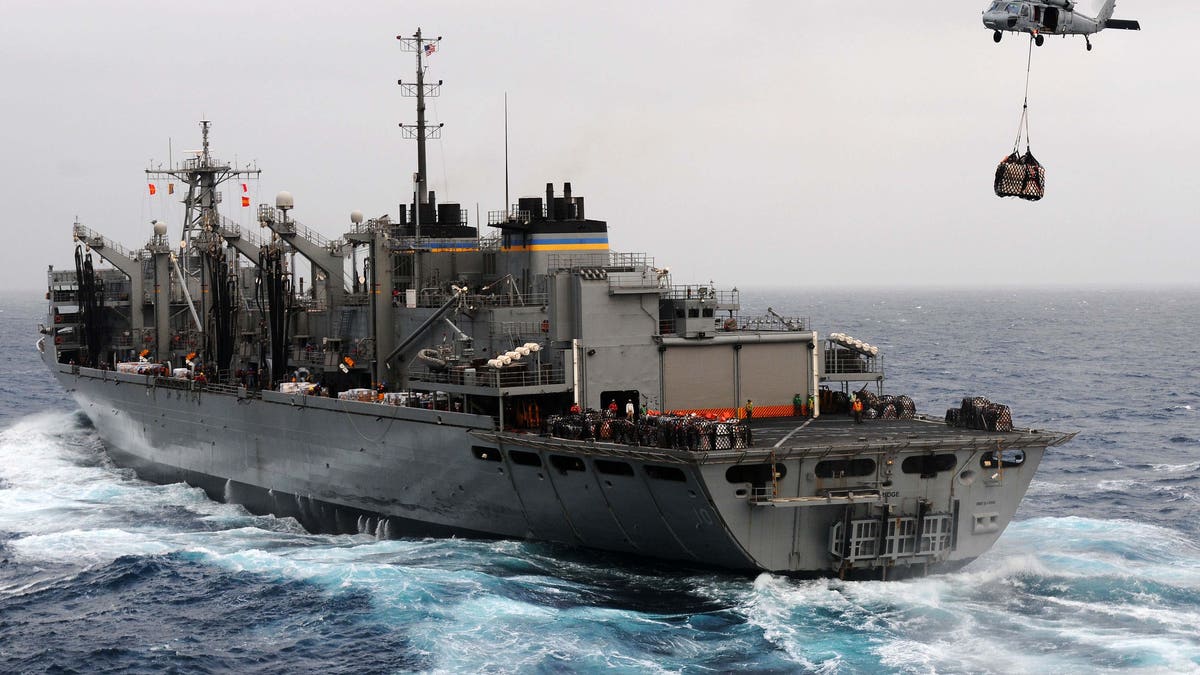
June 23, 2011: An MH-60S Sea Hawk helicopter assigned to the Wild Cards of Helicopter Sea Combat Squadron (HSC) 23 transfers cargo from the Military Sealift Command fast combat support ship USNS Bridge (T-AOE 10) during a replenishment at sea with the aircraft carrier USS Ronald Reagan (CVN 76), not pictured. (U.S. Navy / Mass Communication Specialist 2nd Class Kevin B. Gray)
The U.S. Navy will start giving Breathalyzer tests to Marines and sailors reporting for duty aboard ships and submarines and at squadrons, Secretary of the Navy Ray Mabus announced Monday in a worldwide call to forces.
The testing is part of a new 21st Century Sailor and Marine initiative -- a multi-prong program aimed at reinforcing healthy lifestyles both on and off-duty. The program emphasizes healthy lifestyles through nutrition, responsible alcohol consumption, zero tolerance for drug use and fitness programs as well as suicide prevention, family and personal preparedness and financial planning.
Not only will sailors reporting for duty watch have to submit to alcohol testing, random Breathalyzers will be done elsewhere "to reduce the occurrence of alcohol-related incidents that can end careers and sometimes end lives," the Navy confirmed to Fox News.
"This is not done to punish, but to help. We want to help sailors and Marines make good choices before something happens that can't be undone," Mabus said during remarks given aboard the USS Bataan in Norfolk, Va., which were televised and web-streamed live to the fleet.
Mabus said the goal is to maximize readiness, fitness and safety.
"When a sailor's or Marine's time in the military ends, whether it is after four years or 40, we want your productive life to continue and for you to leave the service in better health, more trained and better educated than when you came in," he said.
Alcohol screening equipment will be installed onboard ships throughout the year. The Marine Corps also will begin testing among selected units beginning in April.
According to Federal News Radio, a senior Navy official said the Breathalyzer tests would be non-punitive nor legally admissible, and is intended to let commanders of individual vessels get a heads-up about potential alcohol-related problems.
The Navy-wide alcohol testing plan reportedly comes after a successful pilot program in the Pacific submarine force in which alcohol related-incidents reportedly dropped by 45 percent after the tests began. In discussing the initiative, the Navy reported that alcohol-related motor vehicle fatalities are also down.
Federal News Radio reported that, currently, around 180 sailors per month are charged with DUI across the fleet.
The Navy is also beginning random testing of urine samples for chemical compounds like Spice, which is a synthetic marijuana, and will have a contractor conduct in-house testing until the Navy Drug Screening Lab is equipped to handle the new workload. This comes after the lab last month announced that it would undertake more prescription drug testing to look for commonly abused prescription drugs.
All positive drug results will be sent to the Naval Criminal Investigative Service and those found to have positive urinalysis results and wrongful possession of synthetic chemical compounds will be punished under the Uniform Code of Military Justice.
"We have a professional and a moral obligation to lead, to train, to equip and to motivate," said Chief of Naval Operations Adm. Jonathan Greenert.
While emphasizing physical fitness in the "healthy mind, healthy body" mode, the Navy is also adopting a "Fueled to Fight" program fleetwide to provide a "nutrition strategy" to improve performance.
The Navy is also aiming to become a 100 percent voluntarily smoke-free force by offering tools to quit and ending discounts for cigarettes in Navy and Marine Corps exchanges so prices rise to off-base sales.
While the Navy boasted improved safety last year, the new program aims to get sailors and Marines to "apply the same operational risk management skills to their off-duty activities."
"All leaders must guard against reckless behavior -- it jeopardizes the health, safety, and combat readiness of our entire force" said Gen. James F. Amos, commandant of the Marine Corps. "Risk mitigation is one of the best means available as we fight to eliminate senseless and needless loss of life and injury, both on duty and on liberty."
The Navy added that all personnel should "expect to work in a safe environment, free from harassment or hazards, and when confronted with these, have the resources available to immediately correct the problem."
To encourage women sailors of childbearing age to stay in the service, the initiative also will give new mothers12-month deferments from operational assignments.
The Navy is also setting up a new diversity office "committed to attracting, mentoring and retaining the most talented men and women who bring a diversity of background, culture and skill in service to our nation."
"We want to have a force that's ready, fit and healthy, both professionally and on a personal level," Navy Spokesman Cdr. Brenda Malone told Fox News.




